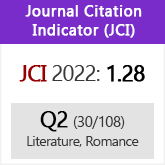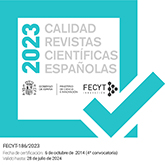Does Google Dream of Connected Sheeps? The Voices of the Noiseless Myriads in Quédate este día y esta noche conmigo (2017) by Belén Gopegui
DOI:
https://doi.org/10.3989/revliteratura.2023.02.025Keywords:
Google, Belén Gopegui, Technological Capitalism, SolidarityAbstract
The aim of this article is to show, using Belén Gopegui’s novel Quédate este día y esta noche conmigo (2017), some links between literature and socio-political engagement in our hypertechnological environment, since in it the author focuses her attention on Google as the epitome of contemporary society. In order to highlight her criticisms and proposals, the text will be brought into dialogue with different essays on the above-mentioned enterprise. In this way, it will become clear which are the most prominent aspects considered by Gopegui, in narrating the experiences of a university student and an ill sexagenarian, to realize her claim and to provide alternatives. Indeed, if on the one hand she reveals the connections between Google and capitalism and the consequences that this entails for ordinary citizens, on the other she suggests some strategies that can be used against a “common sense” that nowadays is increasingly determined by algorithms.
Downloads
References
Auletta, Ken. 2010. Googled. The End of the World as We Know it. New York: Penguin.
Baricco, Alessandro. 2018. The Game. Torino: Einaudi.
Bauman, Zygmunt. 2010. Liquid Times. Living in an Age of Uncertainty. Cambridge: Polity Press.
Becerra Mayor, David. 2015. «Introducción». En Convocando al fantasma. Novela crítica en la España actual, coord. David Becerra Mayor, 7-24. Ciemponzuelo: Tierradenadie.
Becerra Mayor, David. 2018. «Hacia una redefinición de los límites de lo posible: Quédate este día y esta noche conmigo». Ínsula 857: 49-52.
Bonvalot, Anne-Laure. 2012. «Un diálogo sobre el poder. Entrevista con Belén Gopegui», Minerva, 12: 34-37.
Cassin, Barbara. 2018. Google-me. One-Click Democracy. New York: Fordham University Press. https://doi.org/10.5422/fordham/9780823278060.001.0001
Castells, Manuel. 2000. La era de la Información: economía, sociedad y cultura. I. La sociedad red. Madrid: Alianza.
Charles, Sébastien. 2006. «El individualismo paradójico. Introducción al pensamiento de Gilles Lipovetsky». En Los tiempos hipermodernos, Gilles Lipovetsky y Sébastien Charles, 13-49. Barcelona: Anagrama.
Ciplijauskaité, Biruté. 2005. «Belén Gopegui entre la búsqueda y la denuncia de la realidad». En La pluralidad narrativa. Escritores españoles contemporáneos (1984-2004), ed. Ángeles Encinar y Kathleen M. Glenn, 119-131. Madrid: Biblioteca Nueva.
Delgado López, David. 2020. «La trascendencia del bar: espacios y rituales en Quédate este día y esta noche conmigo de Belén Gopegui». Hispanófila 190: 53-63. https://doi.org/10.1353/hsf.2020.0047
Ferrari Nieto, Enrique. 2012. «Inercias y reflejos con Internet: Marías y Gopegui como casos complementarios». Cartaphilus 10: 61-66.
Foucault, Michel. 2014. Sorvegliare e punire. La nascita della prigione. Torino: Einaudi.
Gefen, Alexandre. 2021. L'Idée de littérature. De l'art pour l'art aux éscritures d'intervention. Paris: Corti.
Gopegui, Belén. 2018a. Acceso no autorizado. Barcelona: Penguin Random House Debolsillo.
Gopegui, Belén. 2018b. El comité de la noche. Barcelona: Penguin Random House Debolsillo.
Gopegui, Belén. 2019a. Quédate este día y esta noche conmigo. Barcelona: Penguin Random House Debolsillo.
Gopegui, Belén. 2019b. Rompiendo algo. Escritos sobre literatura y política. Barcelona: Penguin Random House Debolsillo.
Gopegui, Belén. 2021. «¿Novela y?». Orillas 10: 1-3.
Han, Byung-Chul. 2015. Nello sciame. Visioni del digitale. Milano: nottetempo.
Hayles, N. Katherine. 2012. How We Think. Digital Media and Contemporary Technogenesis. Chigago: The University of Chicago Press. https://doi.org/10.7208/chicago/9780226321370.001.0001
Hevia, Elena. 2017. «Belén Gopegui: "Escribir es interesarse por cómo funciona el mundo"». El Periódico 23 de octubre de 2017. https://www.elperiodico.com/es/ocio-y-cultura/20171023/entrevista-belen-gopegui-quedate-este-dia-y-esta-noche-conmigo-6368367
Lovink, Geert. 2019. Sad by Design. On Platform Nihilism. Londres: Pluto Press. https://doi.org/10.2307/j.ctvg8p6dv
Machado, Antonio. 2021. Poesías completas. Barcelona: Espasa.
Martínez, Javier. 2017. «Belén Gopegui: "Las redes sociales son plataformas de rentabilidad"». El Mundo. 22 de septiembre de 2017. https://www.elmundo.es/cultura/literatura/2017/09/22/59c3ffd322601d8f118b45d0.html
Mayer-Schönberger, Viktor y Kenneth Cukier. 2014. Big Data. New York: Mariner Books.
Menéndez Salmón, Ricardo. 2020. No entres dócilmente en esa noche quieta. Barcelona: Seix Barral.
Mora, Vicente Luis. 2011. «4 poéticas de la visibilidad». Diario de lecturas. http://vicenteluismora.blogspot.com/2011/11/4-poeticas-de-la-visibilidad.html
Pardo, Carlos. 2017. «Google y el realismo». Babelia 26 de septiembre de 2017. https://elpais.com/cultura/2017/09/21/babelia/1505995643_170223.html
Rabanal, Hayley. 2011. Belén Gopegui. The Pursuit of Solidarity in Post-Transition Spain. Woodbridge: Tamesis.
Rancière, Jacques. 2011. The Politics of Literature. Cambridge: Polity.
Reyes Martín, Raquel. 2018. «Una historia de violencia: Marta Sanz, Belén Gopegui y la escritura de la resistencia». Tonos digital 34: 1-22. http://www.tonosdigital.es/ojs/index.php/tonos/article/view/1889/978
Sadin, Éric. 2017. La humanidad aumentada. La administración digital del mundo. Buenos Aires: Caja Negra.
Sanz, Marta. 2014. No tan incendiario. Cáceres: Periférica.
Shirky, Clay. 2010. Cognitive Surplus. How Technology Makes Consumers into Collaborators. New York: Penguin.
Siti, Walter. 2018. Pagare o non pagare. L'evaporazione del denaro. Milano: nottetempo.
Vaidhyanathan, Siva. 2011. The Googlization of Everything. And Why We Should Worry. Berkeley/Los Angeles: University of California Press. https://doi.org/10.1525/9780520948693 PMCid:PMC3183724
Valle Detry, Mélanie. 2015. «Belén Gopegui o contar lo que viéndose no se mira». En Convocando al fantasma. Novela crítica en la España actual, ed. David Becerra Mayor, 57-106. Ciemponzuelos: tierrasdenadie ediciones.
Zafra, Remedios. 2017. El entusiasmo. Precariedad y trabajo creativo en la era digital. Barcelona: Anagrama.
Downloads
Published
How to Cite
Issue
Section
License
Copyright (c) 2024 Consejo Superior de Investigaciones Científicas (CSIC)

This work is licensed under a Creative Commons Attribution 4.0 International License.
© CSIC. Manuscripts published in both the printed and online versions of this Journal are the property of Consejo Superior de Investigaciones Científicas, and quoting this source is a requirement for any partial or full reproduction.All contents of this electronic edition, except where otherwise noted, are distributed under a “Creative Commons Attribution 4.0 International” (CC BY 4.0) License. You may read here the basic information and the legal text of the license. The indication of the CC BY 4.0 License must be expressly stated in this way when necessary.
Self-archiving in repositories, personal webpages or similar, of any version other than the published by the Editor, is not allowed.














